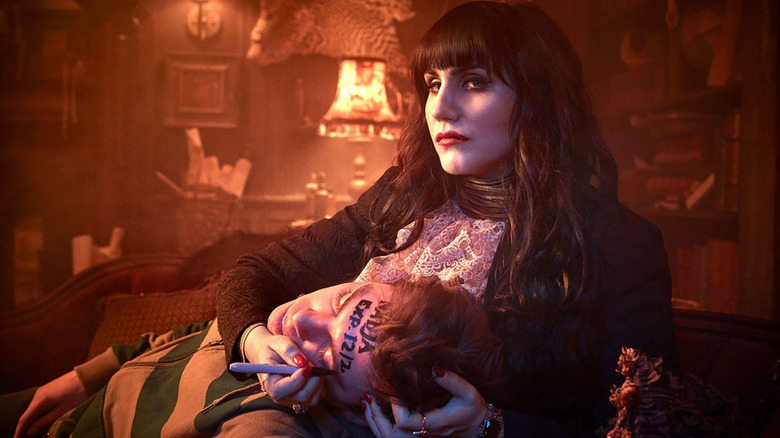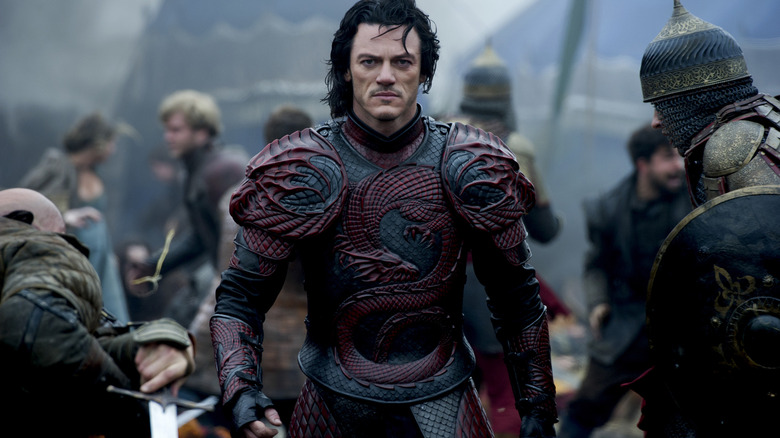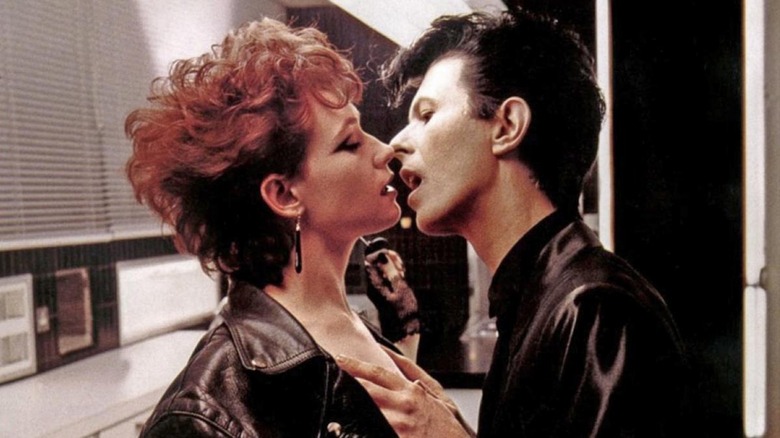Attention Industry Execs: We Still Want Vampire Content, Morbius Just Sucked
(Welcome to The Soapbox, the space where we get loud, feisty, political, and opinionated about anything and everything.)
This year marks the 100th anniversary of "Nosferatu," and here at /Film we've been celebrating the occasion with our ongoing "Year of the Vampire" series. Bloodsuckers have always been a favorite bedfellow for film fans, which is why so many of us have been excited for the upcoming flood of vampire projects. Nicolas Cage is set to play Count Dracula opposite Nicholas Hoult's "Renfield" and AMC is breathing new life into a classic tale with a series version of "Interview with the Vampire. Unfortunately, not all of the highly-anticipated vampire projects are going to see life outside of the coffin.
After years of waiting for Karyn Kusama to bring her Dracula reimagining, titled "Mina Harker," to life, the Blumhouse and Miramax film has been scrapped just a few weeks before production. The film was reportedly taken off the roster due to "creative differences," but that could mean any number of things. Based on how screenwriter (and Kusama's husband) Phil Hay has been discussing the film on Twitter, it sure seems like this was not something anyone on the team wanted to happen, but they tried their best to maintain their vision.
It’s been so heartening to hear all of your support for Karyn and MINA HARKERâ€" a faithful adaptation of DRACULA , seen through Mina’s eyes, set in contemporary Hollywood and a real horror movie. We loved our cast, led by Jasmine, and our extraordinary crew. We gave it our all. ❤️
— Phil Hay (@phillycarly) April 19, 2022
Less than 24 hours prior, Robert Eggers announced on an episode of the "WTF with Marc Maron" podcast that his highly-anticipated remake of "Nosferatu" was not happening at the moment, because there is no god and if there was, we are clearly being punished for our insolence. Two extremely high-profile vampire projects getting kicked to the curb seems too eerie to be a coincidence, and it's hard not to see this as a studio freakout in the wake of the embarrassing box office and critical performance of the vampire superhero movie, "Morbius."
Vampirism isn't why Morbius failed
With superhero movies all but guaranteed to smash the box office, the low turnout for "Morbius" was a massive disappointment for Sony. In its second weekend, the film dropped 73.9% from its debut. While it's earned back its shooting budget, the additional expenses of pandemic-related delays and marketing have not been accounted for, which means the $147.5 million global gross probably wasn't what Sony had in mind when they greenlit a superhero movie with an Academy award-winning actor in the title role.
/Film's own Chris Evangelista captured the failure of "Morbius" perfectly, calling it "an absolutely dreadful piece of pre-packaged junk that throws a bunch of CGI ghoul faces our way and hopes for the best." Sure, the film attempted to pay homage to vampire films and the oft-unfairly maligned era of 1990s superhero movies, but does so in a way that fails to understand what makes both subgenres fun in the first place. Add that to the fact that audiences are growing increasingly annoyed with Jared Leto's off-screen behavior and unsavory history of misconduct allegations, and it's no wonder why "Morbius" couldn't bring home the bacon.
Despite the film's shortcomings, superhero movies aren't stopping anytime soon ... but suddenly, vampire films are? I'm really trying not to wear a tin foil hat about this, but it really does seem like studios are spooked by the film's financial failure and are convinced that vampires are "out," or however out-of-touch executives talk.
Hollywood has never known what to do with successful vampire movies
How you feel about the "Twilight" films doesn't matter, because there's a more important conversation to be had other than whether or not vampires sparkle. When Catherine Hardwicke ("Thirteen," "Lords of Dogtown") was tapped to direct the first film, "Twilight" wasn't expected to make any money. The script was turned down by both Paramount and Fox, allowing Summit Entertainment to say "yes." Hardwicke became responsible for the biggest opening weekend for a female director at the time. Unfortunately, because the film became ridiculously profitable, Hardwicke was kicked to the curb in favor of male directors who would continue the rest of the franchise. Hardwicke understood both vampire films and teenage romance, but producers worried about their bottom line immediately pivoted to a "safer" route, and gave the reins to people who have never known what it is like to be a teen girl in love with someone really, really bad for them.
What about other major Hollywood vampire movies? "Dracula Untold" hit theaters in 2014 and, despite a modestly successful worldwide box office gross, was ripped apart by fans and critics alike. It was also an action fantasy film and not really a vampire film. Examining the last decade, all the recent beloved vampire films have come from outside of Hollywood. "What We Do In The Shadows" may now have a hit Hulu series, but the original film was a feisty indie release that thrived on word of mouth recommendations. Hell, the last vampire film to come out of the studio system and make a good chunk of change that wasn't a remake or part of a legacy franchise was ... *checks notes* ... "Hotel Transylvania." No shade to the Adam Sandler animated vamp films (which I genuinely do love) but I think this further proves my point. Studios are terrified of not making f-you money, and audiences are seemingly afraid of acknowledging the painful realities of immortality, so watering the themes in vampire films down to a place where they can be digested by children feels like the key to success.
Let vampires be horny again
Here's the honest truth — the best vampire films aren't comic book style action films ("Blade" is the exception, don't @ me), they're gripping tales absolutely dripping with sexuality. Even when sexuality is hidden in the subtext in films like "The Lost Boys," a massive part of the danger of vampires is how easily they are able to seduce their prey. Don't get me wrong, there's plenty of fun to be had with nightmare fuel-looking vampires like in "30 Days of Night," but even 1931's "Dracula" plays with the sexual irresistibility of the cloaked Count, with Renfield serving as his begging, submissive bottom. People are fooling themselves if they believe the "Twilight" craze was rooted in "love" and not a bunch of repressed teenagers and unsatisfied housewives totally turned on by the idea of getting boned by an undead hunk who puts you on a pedestal. May this serve as a reminder, "50 Shades of Gray" was originally "Twilight" fanfiction called "Master of the Universe" and I don't think I need to argue in favor of that film's blatant horniness. "American Horror Story: Hotel" let Lady Gaga be a vampire queen who f****, and it's considered by many to be one of the best seasons of the hit anthology. The people have spoken, and they want hot, vampire, sex.
Look, I'm sorry to everyone who worked on "Morbius" that the film wasn't a bigger success because, despite what this title implies, I sincerely don't want any film to fail. That said, it's really grinding my gears that it seems like studios are running away from vampire projects post-"Morbius," especially ones that were pretty universally garnering excitement. At this point, I can only hope that "Renfield" blows away all expectations and ushers in a wave of vampire films. Until then, the Karyn Kusama "Mina Harker" movie in which Jasmine Cephas Jones crossed paths with Dracula in Los Angeles will have to exist in my wildest fantasies. For shame.



